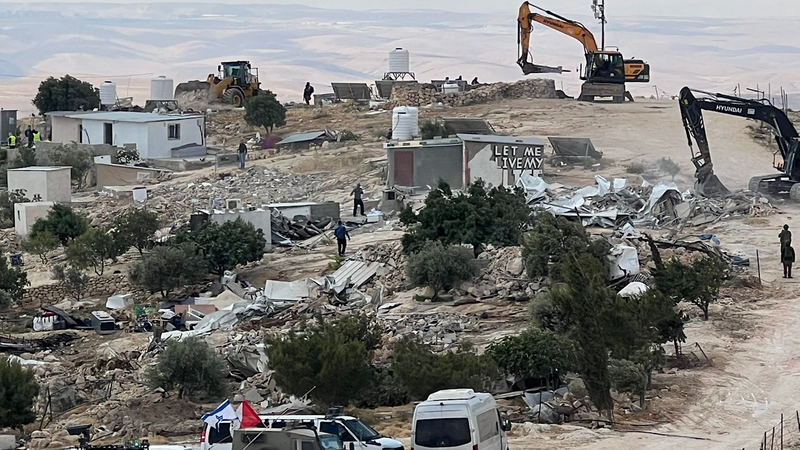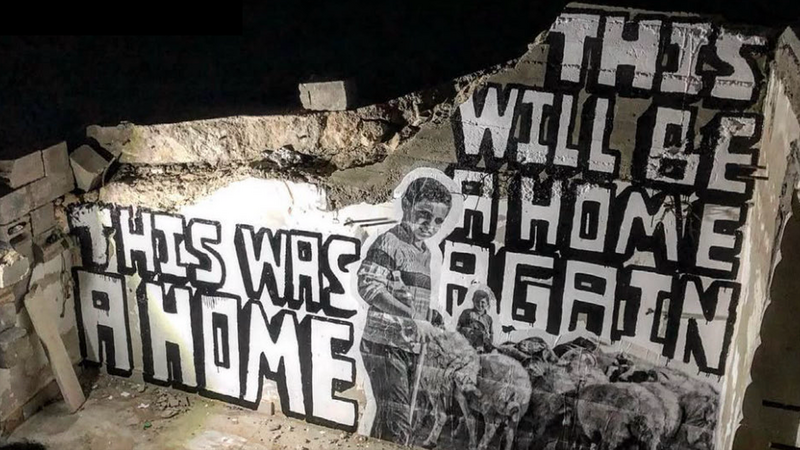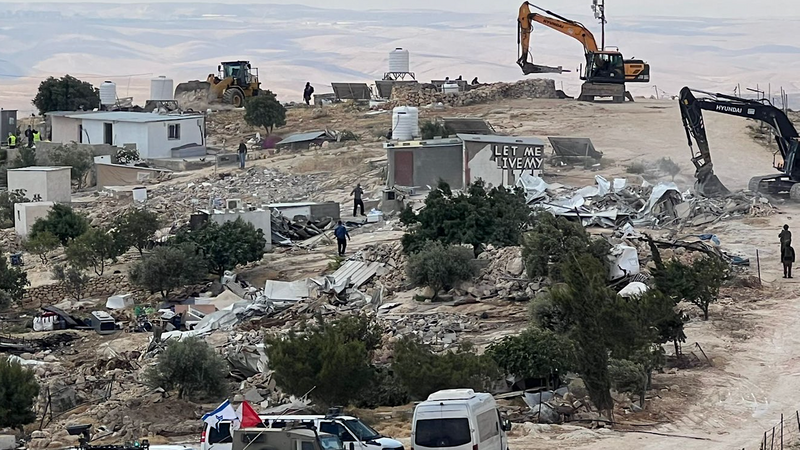
Israeli military excavators tear down the village of Khalet al-Daba in the southern West Bank on 5 May, 2025.
ISM
In mid-August, the Israeli military invaded the village of Ibziq, in the northern occupied West Bank.
On 11 August, soldiers – or settlers dressed as soldiers, opinions varied among villagers and volunteers after the fact – entered school grounds, tampered with waterlines, blocked entry roads, and forced their way into a home. A family member reported that the invaders threatened the family, yelling they would “burn us alive.”
I was there. As protective presence volunteers with the International Solidarity Movement, my partner and I intervened. Yet despite having our hands up, we were beaten and robbed at gunpoint. They took my phone and the cash there.
At one point, the uniformed men, holding me at gunpoint, deliberately trained green dot lasers at my genitals. Targeting the genital area has become a disturbingly widespread practice by the Israeli military and has resulted in the mutilation of numerous Palestinian boys.
A parent later told us: “They will kill our children in the dark.”
Since 7 October 2023, the West Bank has seen one of the most severe escalations in Israeli state-sanctioned violence and settler aggression in decades. As the brutal history of Zionist settler colonialism reveals, dispossession and elimination continue to be the aim.
Israeli occupation forces and Zionist settlers have killed nearly 1,000 Palestinians and displaced over 38,000 people through raids, demolitions and intimidation.
In the same period, over 2,600 Palestinian structures – among them just over 1,000 inhabited residences – have been demolished, seized, sealed off or burned.
Establishing “facts on the ground” in the West Bank’s Jordan Valley has been central to this violence. Armed settlers now patrol Palestinian villages in all-terrain vehicles subsidized by the Israeli apartheid state, often with soldiers present. Forced displacement soon follows.
Lynch mobs
The same week as the Ibzig raid, a Bedouin family was ambushed in the middle of the night in the rural village of Farisiya. Ten masked settlers stormed a home, pepper-sprayed a young man in his sleep, and slashed open his leg. They attempted to strangle him with a chain while he bled, before villagers managed to chase them away.
This type of violence is neither new nor unusual, here or anywhere else in occupied territory. Weeks prior, the family had dozens of sheep stolen and the assaulted young man’s father was attacked by settlers while shepherding.
Days later, in Ein al-Hilweh, Israeli forces demolished several structures, including two homes, despite a court order to delay the action. Front-end loaders – a kind of compact bulldozer – targeted solar panels, water tanks and trees.
The destruction of critical infrastructure erodes conditions that sustain Palestinian existence, said a member of the community: “I’ve lived here for over 60 years. They are destroying everything. Without water and electricity we won’t survive.”
Across the West Bank, these violent forms of collective punishment mirror one another and occur on a daily basis. Indeed, in less than a single fairly representative week since 2023, from 29 July to 4 August, the UN counted over 40 settler attacks on Palestinians across 27 communities in the West Bank resulting in casualties or property damage or both.
Teenager Hamdan Mousa Abu Aliya was shot in the back and beaten by Israeli soldiers in al-Mughayyir near Ramallah in mid-August after settler intruders torched cars and homes in his village with the army standing by. His killing reflects the Israeli apartheid state’s fusion of settler and military terror.
A month prior, in Hamamet al-Maleh in the Jordan Valley, settlers slaughtered and stole hundreds of sheep, destroyed tractors, and attacked unarmed residents. Instead of detaining the perpetrators, Israeli soldiers detained Palestinian victims, one of whom was hospitalized.
In Ein Ayyoub, near Ramallah, over 100 Bedouin Palestinians were expelled from their community on 13 August after settlers from a new outpost, backed by the army, declared the area a “closed military zone.”
Families were corralled overnight and forced out while settlers taunted them.
Dehumanization and trauma
Israel uses a myriad of ways to evict communities and carry out its annexation campaign in the occupied West Bank. As the Gaza genocide and E1 settlement plan clearly illustrate, Israel is hellbent on wiping Palestine off the map.
But while the rubble of demolished homes and charred remains of burned-out fields is devastating, families across the West Bank also say the damage of Israeli state violence and settler aggression is just as cruelly psychological.
From personal experience, the fear, panic and desperation is palpable.
Defiant mothers push through exhaustion with frayed nerves owing to incessant settler raids. Children weep and tremble in terror after being antagonized by bullying and aggressive Zionist youths, who enjoy total impunity. Bedouin shepherds are constantly on edge, even when praying.

Graffiti in the rubble of a demolished home in Khalet al-Daba.
ISM
Chronic anxiety corrodes what should be a tranquil Jordan Valley countryside. Constant desolation and dismay define the day. Families are ground down preparing for the next ambush. “At night, every sound wakes us up,” a woman in Farisiya told me. “They want to kill us.”
Racial hatred and humiliation animate settler violence. Palestinians are denigrated as “infiltrators” and “roaches” that must be exterminated. People are being humiliated, forced to their knees at gunpoint, as has happened to me. Elders must sit silently or risk being shot as homes are leveled.
Trauma accrues – day-by-day, decade-by-decade – with each new attack. Children inherit their parents’ dread and youths grow up scarred by the dehumanizing abuses of Israel’s apartheid. Entire communities must fend off despair, grief and anguish every moment of the day.
State-sponsored violence
Acts of settler colonial harm are premeditated and state-sponsored. Settlers trespass with impunity to vandalize homes, sever waterlines, slaughter animals and steal resources. The goal is to torment, break the spirit, and ultimately dispossess Palestinian shepherds and farmers.
Israel’s deliberate destruction of water sources, solar electricity panels and olive trees – along with the targeting of livestock across the West Bank – is designed to hinder Palestinian agriculture and uproot families. Lost income and poverty compound already elevated levels of anxiety.
Settler aggression has surged even as armed resistance has been stifled, including by the Palestinian Authority, further laying bare the apartheid regime’s explicit policy of militarized annexation of the West Bank. The Israeli state is barely trying to conceal its malicious intentions with purported claims of eliminating “security threats.”
A quick glance at the historical record also reinforces this. The current campaign of violence follows the pattern of the 1948 Nakba, when villages were torched, villagers were killed in programmatic violence and families expelled.
It is a continuous Nakba that is being perpetrated by both the Israeli state and its imperialist, Western allies.
No Palestinian is safe and neither non-human life nor nature is spared.
“They hate us and want us dead and gone,” a shepherd in the Jordan Valley bluntly told me while grazing his sheep. “But where do we go? This is our home, our history. This is our land.”
These are the realities of Zionism across Palestine. In one area, ceaseless terror and compounding traumas are methodically meted out by occupying settler colonizers to beat families down – physically and emotionally – until they leave the land. In another, genocidal aggression by popular demand.
Despite the savagery, Palestinians persist. Families rebuild homes, pastoralists tend to their flocks, farmers sow in the fields and children set off to school.
Existence becomes resistance.
Indeed, care and compassion – as well as ancestral memories – have not been extinguished.
The writer is an ISM volunteer and professor of emancipatory politics engaged in direct action and the documentation of settler colonial violence across occupied Palestine.

